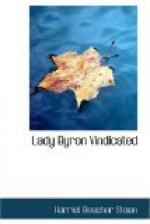Nine days after this, under date of March 17, Lord Byron says, ’We mean to metropolize to-morrow, and you will address your next to Piccadilly.’ The inference is, that the days intermediate were spent at Colonel Leigh’s. The next letters, and all subsequent ones for six months, are dated from Piccadilly.
As we have shown, there is every reason to believe that a warm friendship had thus arisen between Mrs. Leigh and Lady Byron, and that, during all this time, Lady Byron desired as much of the society of her sister-in-law as possible. She was a married woman and a mother, her husband’s nearest relative; and Lady Byron could with more propriety ask, from her, counsel or aid in respect to his peculiarities than she could from her own parents. If we consider the character of Lady Byron as given by Mrs. Mimms, that of a young person of warm but repressed feeling, without sister or brother, longing for human sympathy, and having so far found no relief but in talking with a faithful dependant,—we may easily see that the acquisition of a sister through Lord Byron might have been all in all to her, and that the feelings which he checked and rejected for himself might have flowed out towards his sister with enthusiasm. The date of Mrs. Leigh’s visit does not appear.
The first domestic indication in Lord Byron’s letters from London is the announcement of the death of Lady Byron’s uncle, Lord Wentworth, from whom came large expectations of property. Lord Byron had mentioned him before in his letters as so kind to Bell and himself that he could not find it in his heart to wish him in heaven if he preferred staying here. In his letter of April 23, he mentions going to the play immediately after hearing this news, ‘although,’ as he says, ’he ought to have stayed at home in sackcloth for “unc."’
On June 12, he writes that Lady Byron is more than three months advanced in her progress towards maternity; and that they have been out very little, as he wishes to keep her quiet. We are informed by Moore that Lord Byron was at this time a member of the Drury-Lane Theatre Committee; and that, in this unlucky connection, one of the fatalities of the first year of trial as a husband lay. From the strain of Byron’s letters, as given in Moore, it is apparent, that, while he thinks it best for his wife to remain at home, he does not propose to share the retirement, but prefers running his own separate career with such persons as thronged the greenroom of the theatre in those days.
In commenting on Lord Byron’s course, we must not by any means be supposed to indicate that he was doing any more or worse than most gay young men of his time. The licence of the day as to getting drunk at dinner-parties, and leading, generally, what would, in these days, be called a disorderly life, was great. We should infer that none of the literary men of Byron’s time would have been ashamed of being drunk occasionally. The Noctes Ambrosianae Club of ‘Blackwood’ is full of songs glorying, in the broadest terms, in out-and-out drunkenness, and inviting to it as the highest condition of a civilised being. {178a}




